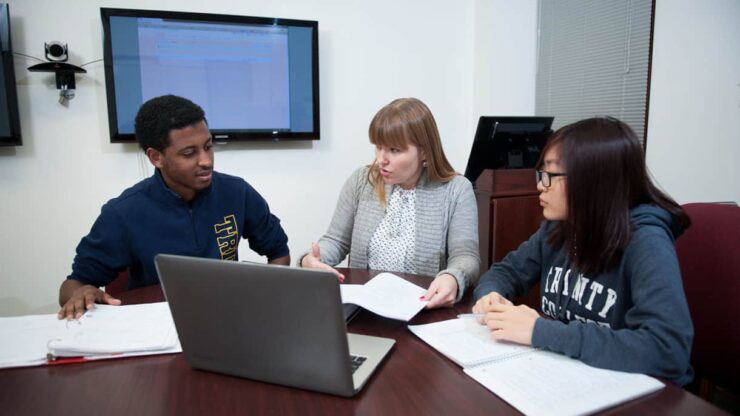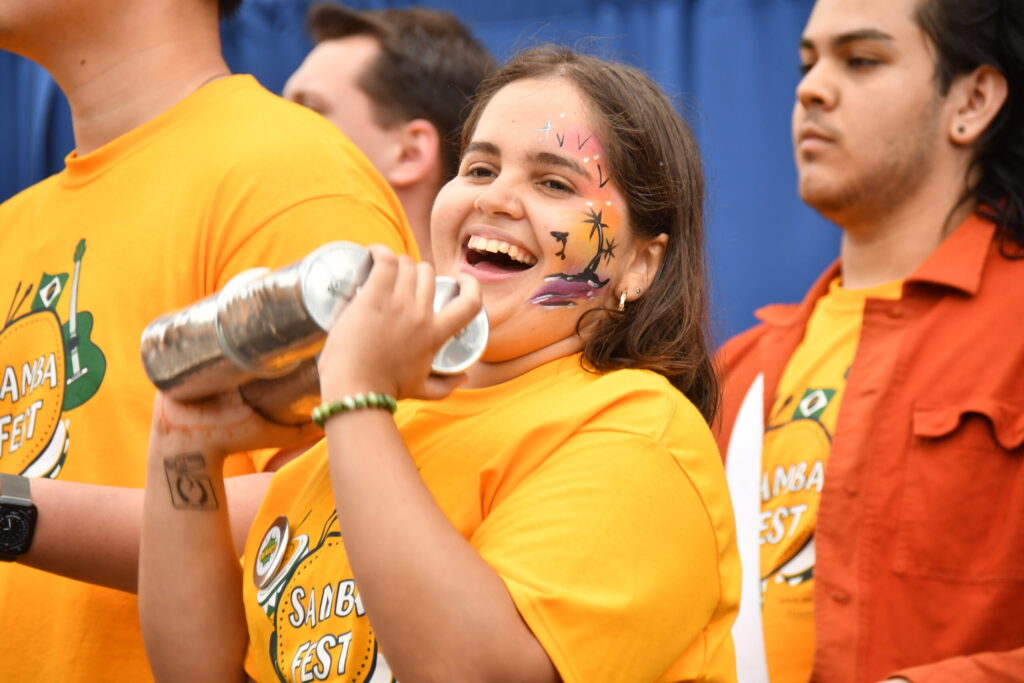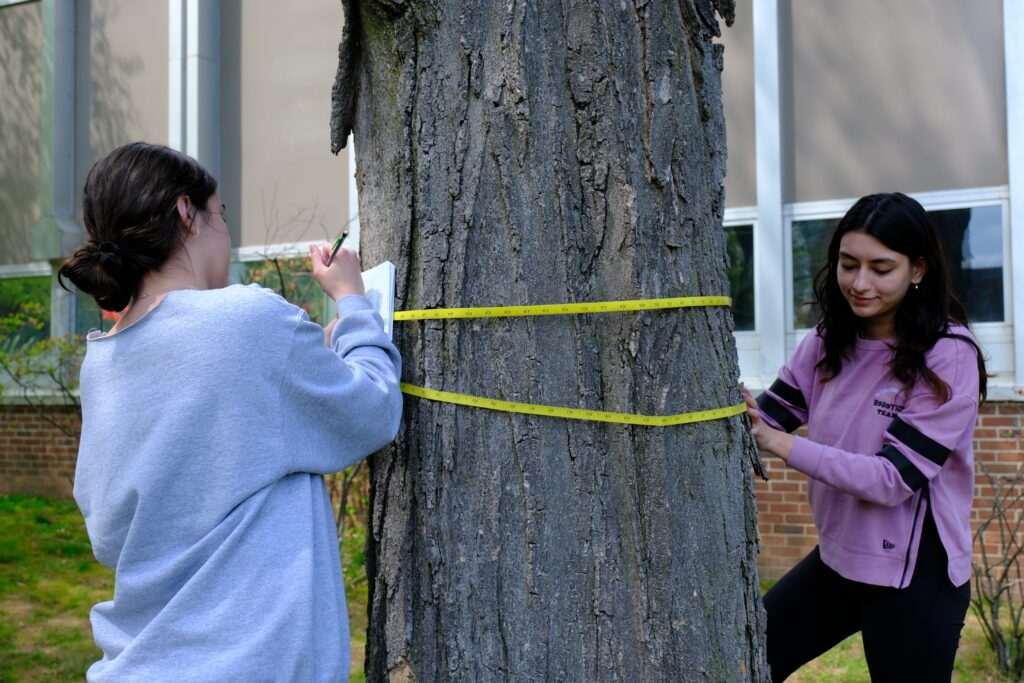Experiential Certificates ‘Push Against the Edge of the Classroom’
As part of the new Trinity Plus Curriculum launched in 2021, the College introduced experiential certificates, which complement the core liberal arts education with integrated courses and applied learning experiences that prepare students for their next steps after Trinity.
“Experiential certificates are all about connecting academic inquiry to professional aspiration,” said Mitchell A. Polin, associate dean for curriculum and professor of theater and dance. “They present an opportunity for students to practice ideas and not just examine them from a distance.”
With 30 experiential certificates now offered—and more being designed by faculty each year—students have the opportunity to pursue deeper, more hands-on studies in highly focused areas. “The faculty is dedicated to expanding ways for students to think about what comes after Trinity, especially in their senior year, and to explore the disciplinary areas about which they are passionate and curious,” Polin said.
An experiential certificate is one way in which students may fulfill the new curriculum’s three “plus” credits, beyond Trinity’s 32 required academic credits. Thirty-five total credits are required for graduation. Each certificate consists of three credits, combining both academic and co-curricular experiences, with at least one credit from both categories. Co-curricular experiences include such opportunities as teaching assistantships; peer teaching and mentorships; internships; short-term global study; research with a faculty member; and most January Term courses.
A completed certificate will be reflected on a student’s transcript, which Polin said will demonstrate to a potential graduate school or employer that the student has worked seriously on a focused topic. “It tells where a student’s passion lies and provides a deeper story of who they are and the work they pursued while at Trinity College,” he said.
“We’re not leaving behind critical ideas and questions that are happening in the classroom—we’re applying them outwards, pushing against the edge of the classroom and into the world,” Polin added. “The hours students spend outside of the classroom matter, too. With these certificates, students continue learning through experiential activities.”
Students interested in more information may contact the Center for Academic and Experiential Advising at [email protected].
Read more about some of the experiential certificates:
Cybersecurity
As cybersecurity threats become more sophisticated, there is a growing need for professionals who not only understand the theory behind cybersecurity, but also have firsthand experience in applying their knowledge, according to Associate Professor of Computer Science Ewa Syta.

“The certificate in cybersecurity will equip students with technical skills and domain expertise complementing the critical thinking, adaptability, and communication skills honed by a liberal arts education,” said Syta, who supervises the certificate along with Professor of Engineering Taikang Ning.
The students earning this certificate are required to complete two credits of selected computer science and engineering courses, in addition to one co-curricular activity, which may take the form of an internship, summer fellowship, or research project with a faculty member.
“Participating in a co-curricular activity provides students with invaluable hands-on experience, emphasizing the multifaceted nature of cybersecurity,” Syta said. “By engaging in real-world experiences, scenarios and challenges, students experience how theoretical knowledge translates into practice and how cybersecurity impacts every facet of an entity.”
Students who earn the certificate will graduate with a distinct advantage, Syta said: “They can either dive into specialized cybersecurity roles with confidence, or leverage their enhanced computer science skill set to any tech-centric role they choose to pursue, providing an edge in the competitive job market.”
Ethnomusicology
“This experiential certificate brings a new dimension of interdisciplinary academic engagement for Trinity students by formally bringing together music and anthropology,” said Professor of Music Eric Galm, who leads this certificate.

Students are required to complete one ethnomusicology course, one anthropology methodology course, and one co-curricular engaged activity, which can be a one-credit research project or a half-credit research experience plus one semester in Samba Ensemble.
“The ethnomusicology experiential certificate allows students to intertwine theoretical and applied practice, affording an opportunity to not only learn about something, but to then put that learning into practice,” Galm said.
In this subject area, students may pursue an internship in the archives of the Watkinson Library; engage with a living culture project at a local museum or other nonprofit institution; or share course learnings with the public through a music program on Trinity’s WRTC radio, for example.
Galm added that students embody learning through doing. “Rather than learning about music and culture through academic textbooks, students can engage directly with heritage practitioners throughout the region. Instead of merely ‘studying’ people and their traditions, student research can help artists to develop comprehensive materials that will help them to promote and convey their work to a wider audience.”
Multidisciplinary Approaches to Climate Emergency
When you have an existential crisis like climate change, you can’t approach it from just one perspective, said Associate Professor of Chemistry Michelle Kovarik, who serves as certificate adviser along with Professor of Language and Culture Studies Johannes Evelein.

“It’s not enough to just understand the science; you also have to understand the policy of it, the psychology of how to help people make choices, and giving people hope through the humanities,” said Kovarik. “Approaching it from different disciplinary lenses is very important.”
The certificate consists of two academic credits earned in climate-related coursework representing two different divisions (i.e., arts, humanities, natural sciences, social sciences) and a co-curricular credit earned through experiential work related to the climate emergency. “This certificate was developed after the faculty passed a resolution years ago that Trinity should engage in ideas about the climate emergency in the curriculum,” said Kovarik.
Kovarik said the faculty wants students to be informed and empowered to do something about the climate emergency, which could take the form of scientific research experiences or internships involved in climate activism. “It’s a really pressing problem that’s going to affect everyone,” she said. “It’s important for all students, whether they want to do something in their professional lives related to climate, or just to be informed citizens.”
The experiential certificates available now are:
- Academic Leadership
- Archaeological Fieldwork
- Bioinstrumentation
- Carceral Systems and Social Change
- Clinical Neuroscience
- Cybersecurity
- Design Thinking
- Digital Communication
- Entrepreneurship
- Ethnomusicology
- Film Curation
- Global Health and Human Ecology
- Information Security
- Innovation
- Machine Learning
- Medicine and Allied Health
- Multidisciplinary Approaches to Climate Emergency
- Multimedia Communications
- Organ Performance
- Private Governance
- Research in Mathematics
- Software Development
- Subject Specific Writing
- Tax Policy and Inequality
- Technical Theater
- Translation in Practice
- Tutoring Academic Writing
- Urban Engaged Learning
- Using Second Language Skills in a STEM Context
- Writing Pedagogy
